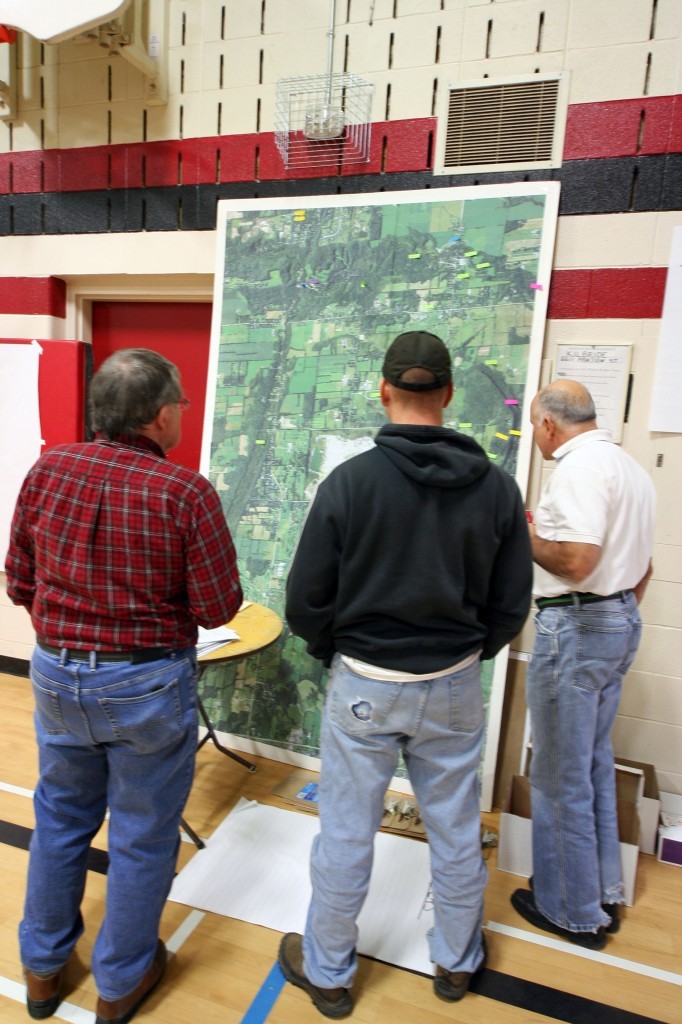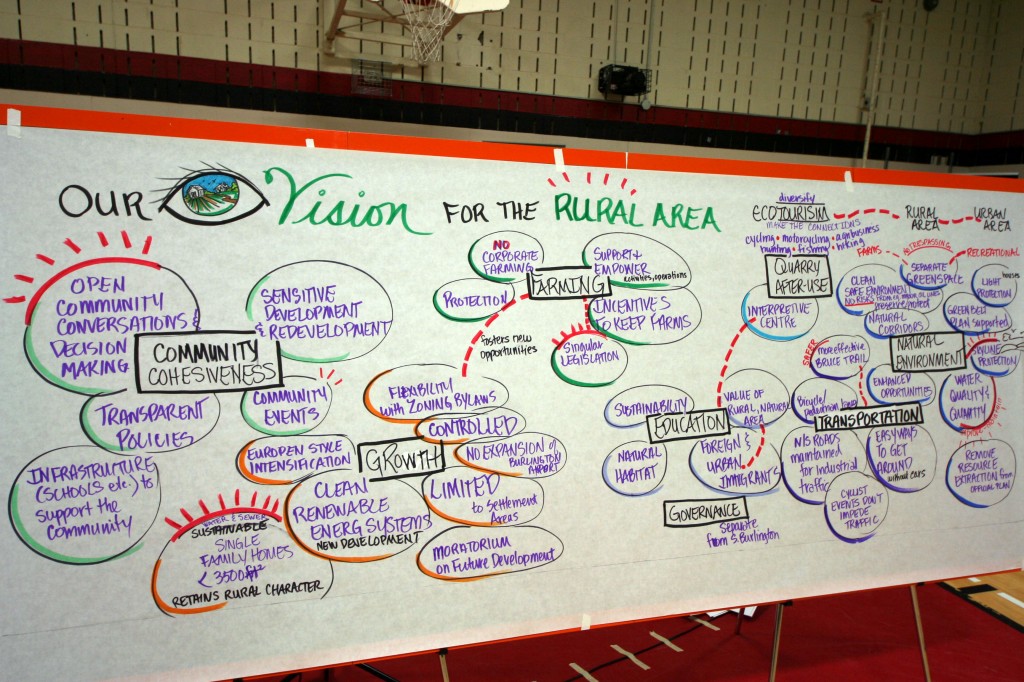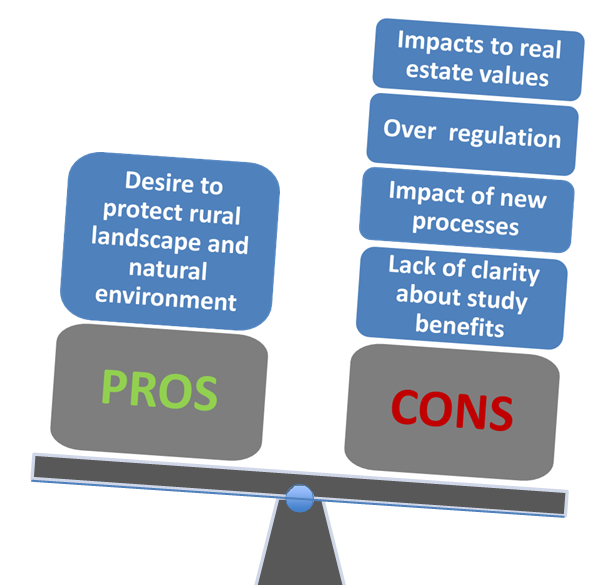 By Pepper Parr
By Pepper Parr
May 4, 2016
BURLINGTON, ON
I think most of the people who attended John Taylor’s constituency meeting at the Conservation Authority office on Britannia Road Monday evening expected to get a really clear explanation as to why the city decided not to go forward with the Mt Nemo study that started back in 2013.
There was an explanation – sort of. A combination of the things the study didn’t have going for it and the amount of money it was going to require (that is more speculation than fact – no one was able to say during the meeting just how much had been spent).

Director of Planning Mary Lou Tanner – joined the city six months ago.
The explanations – three city staff people took a crack at it – was that they were going to go back to all the feedback that came from the Rural Summit in 2013. That event certainly produced a lot of comment – what disturbs is that neither the current planner nor senior policy planner Don Campbell were in place at city hall when that meeting was held.
Staff would have collected a lot of notes and there were probably a number of briefing papers prepared but there is nothing like being in the room to get a sense of what really happened.
It sounded as if the planning people – with a lot of input from the city manager – had decided that everything should come under the Strategic Plan umbrella. The Mt Nemo study didn’t appear to do that – so it got the hook.

Rural Burlington residents look over a large aerial photograph of their part of the city and wonder how ling it is going to remain the way it is.
The Official Plan Review – that is now on again – is to comply with the Strategic Plan. A significant statement in that Strategic Plan is to manage and protect our rural environment. Manage it for who and protect it from what was a question residents asked on several occasions.
The city set out what had been done when the Heritage Character of the Mt Nemo Plateau was being studied.
1. Preliminary Study of the Heritage Character of the Mount Nemo Plateau
2. Heritage Conservation District Study
Assessed character and heritage.
Identified options for the long-term conservation and enhancement of the character and heritage.
Recommended further study.
Key Finding
‘…a distinct historical community represented by a range of heritage features and elements…bounded in such a clear physical manner…the study area can be identified as an organically evolved, continuous Cultural Heritage Landscape’
What is a Cultural Heritage Landscape? A collection of related built form, landscape, vegetation, archaeological resources and other elements that have heritage value.
What is a Heritage Conservation District? What would it do for people within the district. Most felt that all it really was – was another layer of regulation.
Geographically defined area
Protects from unsympathetic alterations
Applies to a collection of historic buildings, streetscapes, landscapes
Areas are referred to as “designated”
Tool to manage change in accordance with a set of Guidelines (Heritage Conservation District Plan)
Plans are unique and is developed with the community
Chronology:
June 2013 Council direction to undertake preliminary research
January 2014 Preliminary assessment presented to Committee
January 2014 Council direction to consult with public
February 2014 Public consultation event shared findings of the preliminary assessment
April2014 Public consultation event to discuss the preliminary study, proposed next steps in starting a Heritage Conservation District Study
May 2014 Council Decision: To proceed with the Heritage Conservation District Study
October 2014 MMM Group retained to complete the HCD study
February 2015 Public meeting to present research and field work completed by MMM Group to date
February 2015 Council direction: Place Official Plan Review reports and Mount Nemo on hold pending start of the new city manager and Strategic Plan.
January 2016 Official Plan Review restarted.
Between February of 2015 and January of 2016 city council was working its way from what started out as a four year Strategic Plan to a document that covers the next forty years.
Rural Burlington residents wanted to know what the benefit was for them from this new approach. The comment was that while downtown grows “up” – the result of intensification, the rest of Burlington would grow outwards which would have more people using the rural part of the city.

The early draft of a vision got put on a huge board and for the most part the community liked the look of what they had said to each other.
Most residents resented the layers of regulation they had to deal with: Conservation Halton, Niagara Escarpment Commission, the Region and then the city. It was too much.

Once the planners had determined what the pros and cons were – the decision was pretty easy to make.
The planning department had two new staffers: a new director and a senior policy advisor – they reviewed everything they had and came to the conclusion that a Conservation Heritage District wasn’t needed, didn’t fit in all that well with the Strategic plan and certainly wasn’t’ what the residents wanted. Their graphic setting out the pros and the cons was enough to convince the politicians.
 Staff saw the killing of the Heritage Conservation Districts as an opportunity to refocus; build on community feedback received to date and find the local vision that they believed came out of the Rural Summit in 2013.
Staff saw the killing of the Heritage Conservation Districts as an opportunity to refocus; build on community feedback received to date and find the local vision that they believed came out of the Rural Summit in 2013.
The air park didn’t get as much as a mention.
Part two will follow.


















I agree Helene. I have attended at least 5 of these meetings for various initiatives and zero action has been taken on them.
Stay home.
And a note to the City: Just pay the fees to the Burlington Post (for advertising the events), the consultants or staff (who organize the events), the food / coffee caterer of choice (for the coffee supplied) and the venue and DON’T hold the event. A great savings of everyone’s time and the money will still flow in the community.
Second note to the City: The Gazette gives way more coverage to your events than the printed news media. Why don’t you advertise in the Gazette and share the advertising budget?
Alert! Alert! have you attended evening meetings, introduced to flip charts with colour circles around great buzz words titled VISION…asked for your opinions…if you have…cancel the next one in your calendar!!!